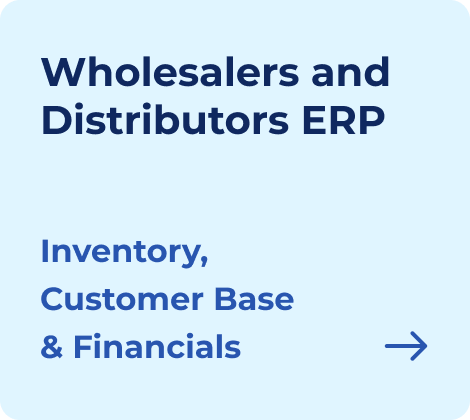Today businesses are witnessing a significant shift in the way ERP systems operate. New technological advancements, especially in AI, cloud solutions, and automation, are redefining how businesses streamline their operations. The future of ERP systems promises improved efficiency, better scalability, and enhanced decision-making capabilities, making them indispensable for SMEs and large enterprises alike.
These innovations allow businesses to embrace agility and improve their competitive edge. From AI-driven insights to the integration of industry-specific features, the latest trends in ERP will empower businesses to tackle challenges more effectively, especially in industries like manufacturing and eCommerce, where precision and speed are key.
Everything you need to manage your business: inventory, sales, manufacturing, warehouses, tasks, workflows, and more.
- AI and Automation in ERP for Intelligent Business Processes
- The Cloud Revolution and the Future of Cloud-Based ERP
- Industry-Specific ERP Innovations for Different Sectors
- The Role of ERP in Data Security and Compliance
- User Experience Focus in ERP for Better Usability
- The Future of ERP Integrations for Streamlining Business Systems
- Frequently Asked Questions About ERP Trends for 2025
AI and Automation in ERP for Intelligent Business Processes
The integration of artificial intelligence (AI) and automation into ERP systems is transforming business operations. These technologies are paving the way for more intelligent, data-driven processes, allowing businesses to optimize decision-making and enhance efficiency. As ERP systems continue to evolve, AI and automation will play a crucial role in helping companies streamline routine tasks, gain real-time insights, and make strategic decisions based on accurate data.
AI-Powered Analytics for Smarter Decision-Making
AI-powered analytics are increasingly becoming a cornerstone of ERP systems, allowing businesses to make data-driven decisions faster and with greater precision. These technologies can process vast amounts of data in real time, offering insights that were previously difficult or impossible to obtain.
In 2025, ERP systems will enable companies to analyze trends, forecast demand, and assess performance in ways that directly influence business strategies. AI’s ability to detect patterns and anomalies will empower decision-makers with predictive insights, helping them respond to market shifts before they occur.
Businesses, particularly in sectors like manufacturing and eCommerce, will leverage AI analytics to refine supply chains, improve customer experiences, and optimize resource allocation — leading to smarter, more agile decision-making.
Automating Routine Tasks and Improving Efficiency
As automation continues to shape ERP systems, it’s transforming routine business tasks such as invoicing, payroll, and inventory management. By automating these processes, businesses will reduce human error, save valuable time, and improve operational efficiency. In 2025, cloud-based ERP for SMEs will automate repetitive administrative tasks, allowing teams to focus on more strategic activities.
For example, automated inventory management will ensure stock levels are always optimized, minimizing the risk of overstocking or stockouts. Similarly, automated payroll processing will increase accuracy and compliance. This shift not only streamlines operations but also cuts costs, enabling small businesses to scale efficiently. Automation in ERP for small businesses and manufacturing industries will be a major driver of growth, enhancing productivity while maintaining cost-effectiveness.
Read‑alikes
ERP Software for Manufacturing: 15 Best Systems
ERP Inventory Management: 12 Benefits for Your Business in Full Guide
MRP vs ERP: A Comprehensive Guide to Business Management Solutions
ERP Software Boom: “It’s Becoming a Single Point of Assembly of All Business Processes”
The Cloud Revolution and the Future of Cloud-Based ERP
Cloud-based ERP systems are at the forefront of transforming business operations. For small and medium-sized enterprises (SMEs), the cloud offers a dynamic, scalable solution that simplifies management and reduces costs. As businesses increasingly adopt digital solutions, cloud ERP has emerged as a key enabler of operational flexibility and efficiency. This section explores the growing impact of cloud ERP on SMEs and highlights how this shift is shaping the future of business management.
Flexibility and Scalability for Small and Medium Businesses
Cloud-based ERP systems are particularly beneficial for SMEs due to their inherent flexibility and scalability. Traditional on-premises ERP solutions often require heavy upfront investments in infrastructure and maintenance. In contrast, cloud ERP allows businesses to scale operations up or down based on changing needs, without the burden of costly hardware or IT staff.
This flexibility makes cloud ERP a more accessible option for SMEs looking to grow without the need for constant system overhauls. With cloud-based ERP, small businesses can respond to market changes with agility, adopting new features and expanding their capabilities as they evolve.
Remote Access and Real-Time Collaboration
One of the most significant advantages of cloud-based ERP is the ability to access systems remotely, facilitating real-time collaboration among teams, regardless of location. This level of connectivity enhances operational efficiency by enabling employees to collaborate seamlessly across departments and geographies.
For decision-makers, cloud ERP provides immediate access to key data and insights, supporting faster, informed decision-making. As more businesses embrace remote work and global collaboration, cloud-based ERP will play an increasingly important role in maintaining continuous workflows and ensuring that all stakeholders are aligned with the company’s objectives.
Industry-Specific ERP Innovations for Different Sectors
As ERP systems evolve, a growing trend is the development of industry-specific solutions tailored to the unique requirements of various sectors. These targeted advancements aim to refine processes and offer sector-relevant features that address specific business challenges. This approach is transforming ERP adoption across industries, enabling businesses to achieve operational precision and competitive advantages.
Manufacturing ERP Trends for Streamlining Production and Supply Chain
Manufacturing ERP systems are adapting to meet the complex demands of production and supply chain management. Key trends include:
- Advanced Inventory Management. Leveraging AI and IoT for real-time tracking of raw materials and finished goods, ensuring better stock control and reduced wastage.
- Predictive Maintenance. Using machine learning to forecast equipment needs, preventing unexpected downtime and optimizing operational continuity.
- Enhanced Production Planning. Integration of simulation tools to create detailed production models, which improve resource allocation and production schedules.
These innovations are shaping the future of ERP systems by focusing on automation and agility. For decision-makers, manufacturing ERP trends in 2025 promise seamless integration of technologies that improve efficiency and responsiveness.
E-Commerce ERP Trends for Enhancing Customer Experience and Order Management
E-commerce businesses are embracing ERP solutions designed to handle the fast-paced and customer-driven nature of the industry. Key innovations include:
- Omni-Channel Order Processing. Streamlining inventory updates and order management across multiple platforms, ensuring consistency and accuracy.
- Customer Experience Management. Incorporating real-time analytics to personalize interactions and improve satisfaction.
- Inventory Optimization. Employing automation to predict demand and restock efficiently, reducing the risk of stockouts or overstocking.
These advancements position e-commerce businesses to deliver seamless shopping experiences while maintaining operational efficiency. As ERP software trends for decision-makers evolve, such systems will play a critical role in shaping how businesses thrive in competitive markets.
The Role of ERP in Data Security and Compliance
As businesses increasingly rely on digital systems, maintaining data security and meeting regulatory requirements have become foundational concerns. Modern ERP systems are evolving to safeguard sensitive information and ensure compliance with changing global standards. These capabilities are not just risk mitigators; they are vital for fostering trust and operational stability.
Enhancing Cybersecurity Through ERP Solutions
Cyber threats continue to grow in scale and sophistication, posing significant risks to organizations of all sizes. ERP systems will address this challenge through several key advancements:
- AI-Driven Threat Detection. Leveraging artificial intelligence to identify and neutralize potential cyberattacks before they escalate. By analyzing behavioral patterns, ERP solutions can alert businesses to anomalies in real time.
- Encryption and Data Masking. Incorporating advanced encryption protocols and data masking tools to protect sensitive business information during storage and transmission.
- Access Control and Monitoring. Strengthening user authentication with multi-factor protocols and biometric verification, ensuring that only authorized personnel have access to critical systems.
Meeting Global Compliance Standards with ERP Systems
Adherence to data protection laws and industry regulations is critical for businesses operating in a globally connected economy. ERP systems are adapting to this need by:
- Built-In Regulatory Frameworks. Offering pre-configured templates to meet international requirements and regional tax laws, simplifying compliance for businesses across borders.
- Audit Trails. Automating the creation of transparent, tamper-proof logs that track every system interaction, aiding in audits and legal accountability.
- Dynamic Updates. Ensuring ERP systems stay current with regulatory changes by integrating updates directly into the software, reducing the burden on businesses to manually track and implement new standards.
User Experience Focus in ERP for Better Usability
User experience is becoming a cornerstone in the development of ERP systems, especially as businesses demand solutions that cater to diverse teams with varying technical expertise. In 2025, the future of ERP systems will see a shift toward designs that prioritize simplicity and efficiency, fostering greater adoption and reducing training efforts across organizations.
Intuitive Dashboards and User-Friendly Interfaces
Modern ERP solutions are redefining interfaces by emphasizing clarity and visual intuitiveness. Instead of overwhelming users with data-heavy screens, systems now focus on displaying only the most actionable insights.
- Streamlined Visuals. Dashboards are being designed with minimalistic layouts, using color coding and dynamic charts to help users interpret data at a glance.
- Mobile Responsiveness. Many systems are prioritizing accessibility through mobile-friendly designs, ensuring decision-makers can monitor operations or approve workflows even while on the move.
- Search Optimization. Advanced search functions powered by natural language processing are making it easier for users to locate specific data without prior knowledge of system structures.
This trend reflects the ERP evolution toward making digital tools accessible even for users with no technical background, a significant consideration for decision-makers in SMEs and large enterprises alike.

Personalized User Experiences for Different Roles
Role-specific customizations in ERP systems allow teams to focus on the tools and data relevant to their responsibilities.
- Custom Workflows. Managers can configure workflows specific to their departments, such as production scheduling for manufacturing or inventory tracking for supply chain teams.
- Tailored Dashboards. Individual users can personalize dashboards to prioritize frequently accessed data, boosting efficiency and satisfaction.
- Adaptive Learning Systems. Integrated AI analyzes user behavior to suggest shortcuts, relevant features, or training resources, reducing onboarding time significantly.
The Future of ERP Integrations for Streamlining Business Systems
ERP systems are advancing beyond traditional boundaries, becoming central hubs for managing diverse business processes. By integrating with third-party applications, they offer enterprises a unified ecosystem that eliminates redundancies and improves efficiency. These ERP software trends for decision-makers are particularly significant for SMEs embracing cloud-based ERP solutions.
Seamless Integration with CRM, HRM, and Accounting Tools
Modern businesses rely on various software systems to handle sales, human resources, and financial operations. Integrating ERP with CRM, HRM, and accounting tools removes silos and creates an interconnected environment.
- Real-Time Data Flow. When ERP systems sync with CRM, sales teams can view inventory updates instantly, while accounting teams access accurate revenue data for forecasting.
- Unified Employee Management. Integration with HRM systems simplifies workforce planning, linking payroll, scheduling, and performance data to ERP-driven financial and operational strategies.
- Error Reduction. Automating data exchange across platforms minimizes manual entry, reducing inaccuracies and saving time.
Open APIs and Extensibility for Custom Solutions
As businesses demand more specific functionalities, open APIs have become essential for ERP systems, allowing for tailored integrations.
- Custom Tools for Niche Needs. With open APIs, companies can connect ERP systems to industry-specific tools, such as advanced manufacturing equipment tracking or specialized e-commerce platforms.
- Future-Proof Extensibility. Open APIs ensure that ERP systems can adapt to new technologies without requiring complete overhauls, supporting business scalability.
- Developer Ecosystems. Many ERP providers are building ecosystems where developers can create plugins or extensions, offering businesses ready-to-deploy solutions for unique challenges.
Frequently Asked Questions About ERP Trends for 2025
As ERP systems evolve, they address the unique needs of businesses across industries. Below are answers to some common questions about ERP trends for 2025, offering valuable insights for decision-makers evaluating ERP solutions.
What are the top ERP trends to watch in 2025?
The future of ERP software will emphasize integration with AI, providing real-time insights and predictive analytics. Cloud ERP trends highlight scalability and accessibility, especially for SMEs, while industry-specific innovations will cater to sectors like manufacturing and e-commerce.
How will AI change the way businesses use ERP systems?
AI in ERP systems will advance automation in ERP 2025 by optimizing processes such as demand forecasting and inventory control. Businesses will benefit from enhanced data-driven decision-making, reducing inefficiencies and improving agility.
Why should SMEs choose cloud-based ERP solutions in 2025?
Cloud-based ERP for SMEs offers cost-effective solutions with flexible scalability. These systems allow small businesses to adapt quickly to changes without significant upfront investments, making them ideal for dynamic markets.
What are the key ERP innovations in manufacturing for 2025?
Manufacturing ERP trends include predictive maintenance, minimizing downtime through early issue detection, and advanced inventory management that balances stock levels efficiently. Improved supply chain visibility ensures smoother operations.
How will ERP systems improve data security in 2025?
ERP software trends for decision-makers include enhanced cybersecurity features such as AI-driven threat detection and encryption protocols, addressing growing concerns about data breaches.
Can ERP systems help businesses comply with global regulations?
ERP innovations for small businesses include tools for compliance management, helping organizations adapt to changes in tax laws, data protection standards, and other regulations.
How will eCommerce ERP systems improve order management in 2025?
Ecommerce ERP trends focus on streamlining multi-channel order processing, integrating platforms like Shopify, and improving customer management through better inventory synchronization.
What role will UX improvements play in ERP adoption?
Simplified interfaces and customizable dashboards will reduce training time and make ERP systems more approachable for users, increasing adoption rates.
How can ERP systems help businesses become more sustainable?
Digital ERP trends include features for tracking environmental impact, enabling businesses to adopt sustainable practices and align with CSR objectives.
How can businesses ensure that their ERP system integrates with other software?
Open APIs and standardized integration protocols allow ERP systems to connect seamlessly with popular tools like CRM, HRM, and accounting software, supporting cohesive workflows.


